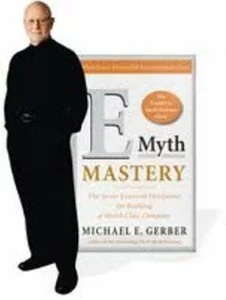
Michael E. Gerber
Christoff Oosthuysen reviews “E-Myth Mastery – The Seven Essential Disciplines for Building a World Class Company” by Michael Gerber published by Harper Business (2005).
Those just published books that recently landed on my desk all seemed rather esoteric, so I chose to go back to my bookshelf in search of a title to introduce to the Small Business Connect community this month.
Perhaps not by chance, my eye fell on Michael Gerber’s name. Was he not the entrepreneurial business coach whose work changed my thinking on the real job of a business owner?
Did he not teach me about being obsessed with creating a perfectly functioning business?
Indeed! Michael Gerber is arguably The most influential business coach of the past 30 years.
And he surely shifted my thinking with his short, but deeply impactful observation that the job of the entrepreneur is to “work on the business, not in it”.
I must repeat what he says because it is so profound:
The job of the entrepreneur is to work on improving his or her business, not in the making of its product or service.
Gerber has promoted this thinking for over 40 years.
He has done this through his consultancy business in California and through the various books he has published.
One of which, the best known is “The E-Myth – Why Most Business Don’t Work and What To Do About It”, which he first published in the 80s.
WORK ON YOUR BUSINESS
The assertion that you should be working on and not in your business implies that the outcome of your labour should be a well functioning business that will thrive even if you are not present. If you are involved in making the product or service offered to your customers, you are working in your business. Gerber’s point is that you should see the whole business as your product and that your task is to work at making this a “world-class company”.
As he aptly puts it in “E-Myth Mastery”, “knowing how to do the work of a business has nothing to do with building a business that works.”
But before I get to talking about the “mastery” included in the title of the book I am reviewing here, let’s pause for a moment at the idea underlying his use of the concept “e-myth”.
The “e” in “e-myth” of course refers to “entrepreneurship” and the myth Gerber talks about is the notion that all business owners want to create a fabulously innovative and creative business. This myth, he says, leads many entrepreneurs down a road of disaster. Rather, he says, most business owners just want to have a smooth running organisation that delivers value to its customers and makes good money in the process. If they could choose, they would opt for a “turn-key” solution, very much like owning a branch of a franchise where the perfect system has already been designed.
PASSION AND PURPOSE
In his earlier books, of which many are aimed at specific industries, Gerber offered a very convincing argument for refraining from working in your business and starting to work on it. But then, after the turn of the century, he published “E-Myth Revisited” and shortly after “E-Myth Mastery”, where he identified a huge shortcoming in his previous solution. Through conversations with a client that followed the “e-myth principles”, Gerber explained that an important element needs to be added to offer entrepreneurial meaning. This, he said, is to understand the driving force behind the entrepreneur… the passion or deeper purpose that gives meaning to what you do as an entrepreneur.
Which brings us to the book I am reviewing here – “E-Myth Mastery”.
In this book Gerber maintains a solid focus on the nitty-gritty of running your own business, but combines the practical leadership requirements needed to run a “world-class company” with the deeper motivation of the entrepreneur. He explains this deeper motivation as the “passion or purpose” of the entrepreneur and the willingness to explore self-improvement. You need to practice to get better, he says, since there is a direct link between the willingness of the entrepreneur to keep improving him- or herself and the success of the business. The lack of vision he says is what creates “a cloud of misdirected activity”, adding that in order for your business to change, “you have to change first”.
“E-Myth Mastery” is based on the development programme Gerber offers businesses owners who sign up for his support. It is a solid book – but what can you expect to find in its more than 400 pages?
The book is divided into two sections, first one offering insights into issues around passion, purpose, practice, self-improvement and vision, and then, in the second section moving on to the detail of leading a world-class company through seven essential disciplines.
These disciplines, each covered in a self-contained chapter, are: the discipline of the enterprise leader, of the marketing leader, of the finance leader, of the management leader, of the client fulfillment leader, of the lead conversion leader, and the discipline of the lead generation leader.
If you own and manage your own business you are sure to benefit from clarifying your vision, showing willingness to change and then achieving your goals by applying the seven disciplines to your business. Get hold of this book. Learn from a master. Then go create a world-class company!
- Christoff Oosthuysen is an Institute of Business Advisors accredited business advisor and entrepreneurial coach. He is also publisher of Small Business Connect.
